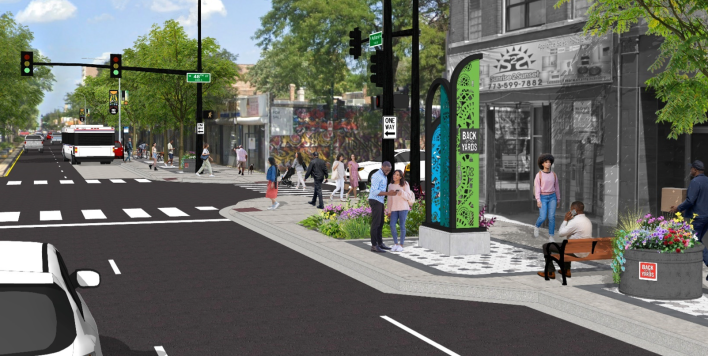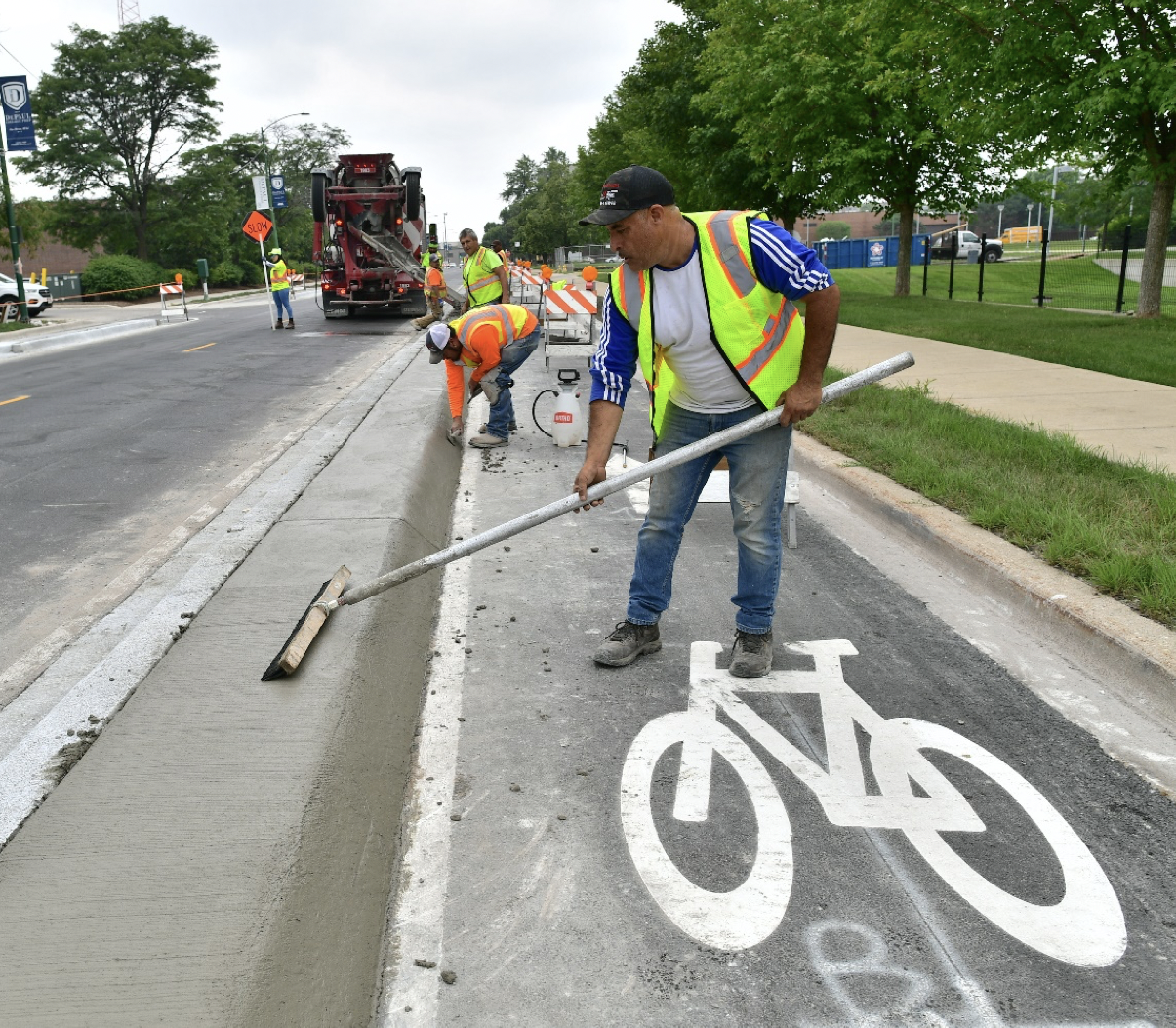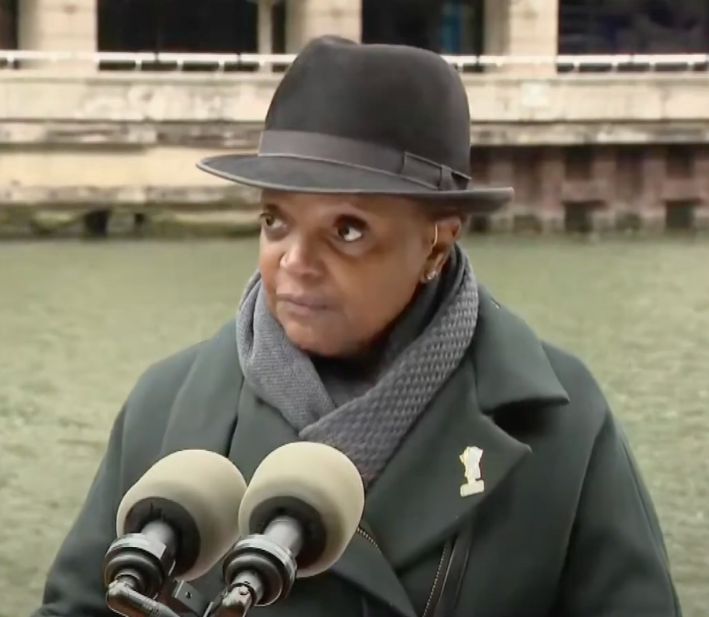Compared to Rahm Emanuel before her, who quickly accomplished many ambitious sustainable transportation projects, Mayor Lori Lightfoot's administration has been marked by relatively modest gains for walking, biking, and transit. However, the pace of pedestrian and bicycle improvements picked up somewhat after Lightfoot announced the launch of the five-year, $3.7 billion Chicago Works infrastructure program.
Today Lightfoot announced her proposal for the next two years of capital improvements with the release of the updated 2023-2024 infrastructure plan (read it here) with a press conference at the Dearborn Street bridge, which is currently being renovated. City officials say the plan "combines condition assessment data, with an equity-focused approach to address long-standing and persistent injustices of inequitable distribution of resources in the city of Chicago," and assert that it will create more than 6,800 local jobs. Alderpersons will vote on the plan as part of Lightfoot's 2023 budget proposal.
"Ultimately, the goal of this multi-year initiative is to thoughtfully invest in our City’s collective wealth – our streets, sidewalks, bridges, and waterfronts, etc. – to uplift the quality of life for all Chicago residents," Lightfoot said in a statement. "We’re heading into year three of our first five-year plan and, already, residents are experiencing the benefits of this work with enhanced street safety, cleaner waterways, and improved public facilities throughout our city."
According to a press release, accomplishments during the first two years of Chicago Works have included concrete repairs at more than a thousand locations, 21 bridge repair projects, starting three bridge replacement projects, paying for more than 170 miles of street resurfacing, building over 200 blocks of new street lighting, installing 45 new miles of bike lanes, bankrolling improvements along another 110 miles, starting construction on three INVEST South/West streetscapes, engineering the Morgan Shoal section of Lake Michigan, finishing renovations at 51 city facilities, and buying over 450 pieces of equipment.
The 2023-2024 plan calls for spending a significant amount of money on amenities for first responders, including buying 530 police vehicles and 80 fire department vehicles and equipment, upgrades at more than 50 public safety facilities, building a police driver training facility, $10 million in police district upgrades, $14 million for surveillance cameras, and the purchase of bunker gear for new fire department recruits.
Other proposals in the plan include (the city's language):
- Aldermanic Menu Program: $216 million over two years – includes $1.5 million per ward per year plus supplemental Chicago Department of Transportation funding.
- Bridges and Viaducts: $114.2 million – 20 bridge replacement projects, $47.0 million for strategic bridge repairs, $8.3 million to rehabilitate seven underpasses annually; and $12.0 million to completely reconstruct two viaducts.
- Streets and Alleys: $251.7 million – residential and arterial street resurfacing based on the Pavement Condition Index and ADA Ramp needs. Also funds the reconstruction of WPA streets, 100 new Green Alleys.
- Street Lighting: $79.3 million – complete replacement of 200 blocks of residential lighting (two blocks per ward per year) and 100 blocks of arterial lighting, along with strategic targeted light pole replacements and wiring stabilization repairs.
- Traffic Signals: $81.1 million – modernize City’s historically underfunded traffic signal system with 60 full intersection replacements, critical intersection signal modifications, traffic signal interconnectedness, and battery back-ups.
- Sidewalks and Pedestrian Right-of-Way: $64.1 million – sidewalk repair (hazardous, vaulted, shared sidewalk programs, ADA ramps, curb and gutter, and alley aprons) to increase accessibility and public safety.
- Complete Streets: $58.0 million – improvements to and creation of new bike lanes, improvements to priority bus routes and Vision Zero pedestrian safety projects, $13.9 million for pavement markings, $166 million for 17 streetscape projects including those in Invest South/West Corridors, and $6.0 million for public art projects.
- Waterways & Pathways: $85.0 million – reconstruction of one mile of lakeshore encompassing Morgan Shoal and engineering of the Promontory Point. $48.0 million towards the construction of the Englewood Trail.
- Facilities: $197.7 million – core facility renovations and facility upgrades to public facilities such as Department of Family and Supportive Service centers, Chicago Department of Public Health locations, Chicago Public libraries, and dozens of non-public facing facilities. This budget also includes environmental remediation of city-owned land and demolition of hazardous buildings.
- Equipment: $153.5 million – addressing city’s aging fleet including purchasing over 280 light and medium duty electric vehicles, $107.8 million to fund the City’s IT Modernization efforts, $14.0 million for public safety cameras, and $2.2 million for bunker gear.
- Lead Service Line Replacement – Private: $60.0 million – funding backstop for the 4,000-5,000 annual leaks and brakes that will require public and private lead service lines to be replaced starting January 1, 2023.
- Economic Development: $40.0 million – catalytic grants to help economic growth along disinvested commercial corridors.
"We take very seriously safety on our roadways, and one of the things that we can do is invest in that infrastructure and design streets so they're safer for everyone," CDOT chief Gia Biagi said at today's presser. "So we're on pace to install more than 400 projects in 2022 that improve safety and comfort. That's pedestrian refuge islands – that's a place you can stop in the middle of the street and be safe and wait for traffic to pass. Those bump-outs... that's that piece of the sidewalk that gives you a little more room to wait to wait [for traffic] to pass, and it shortens the distance of that crosswalk, so it's easier to get across."

"We doing projects like that all over the city," Biagi continued. "We're flipping our bike lanes into concrete. We're creating networks for communities to get around their neighborhoods safely and simply all over the city." She added the department is also incorporating pedestrian safety upgrades into "meat-and-potatoes" projects like street repaving.
After the announcement of Chicago Works in April 2021, advocacy groups voiced concerns that the plan might simply advance the car-centric status quo, due to a lack of details on how the money would be spent. They also argued that there was little transparency and no public input on the project solution.
"We encourage the city to continue to prioritize the safety of pedestrians, bicyclists and those with disabilities with every transportation infrastructure investment and to sustain the focus on the needs of historically disinvested communities," MPC transportation director Audrey Wennink told Streetsblog today.
Oboi Reed, founder of the mobility justice nonprofit Equiticity, said, "Equiticity supports the city’s significant investment in public infrastructure in racially marginalized communities, as a primary strategy to reduce traffic violence, encourage sustainable transportation options, spur economic development, and help reduce interpersonal violence at the neighborhood level. We continue to advocate for the mayor to formally operationalize racial equity into the 2023-24 Chicago Works Plan, work in full partnership with Black- and Brown-led community-based organizations at the neighborhood level, and publicly measure the plan’s impact on improving life outcomes Black and Brown people in our city."





